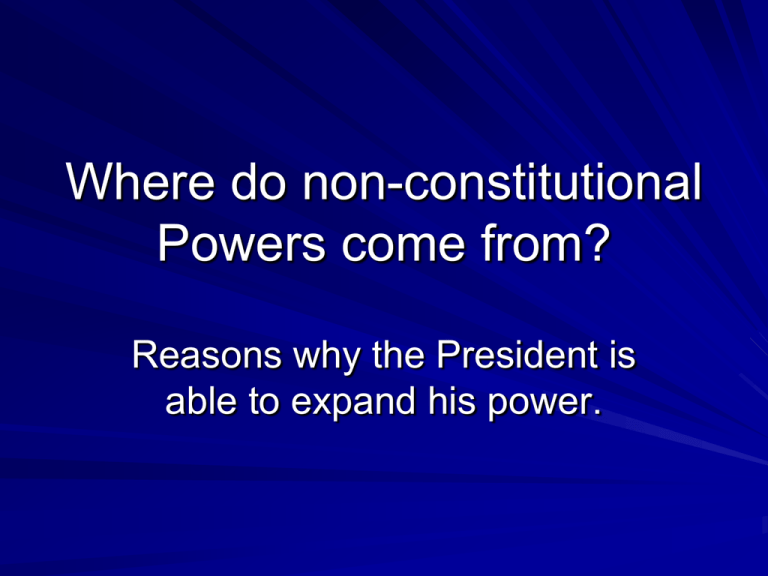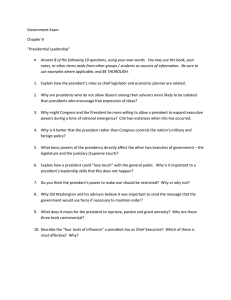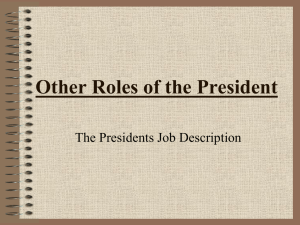Where do non-constitutional Powers come from? Reasons why the President is
advertisement

Where do non-constitutional Powers come from? Reasons why the President is able to expand his power. Sources Unity of Office – Power is held by one man, as opposed to the 535 member congress Character Strong personalities can have great impact. Complexity of Society Because of a growth of technology and industry people have demanded that the government play a larger role in areas of public concern. Congressional delegation of authority to the Exec Broad legislation lets the Executive “fill in the holes” Congress often bows to Presidential demands in times of Crisis Congress Con’t Congress bows to President when he can proclaim a mandate from the people after a large victory USE OF THE ELECTRONIC THRONE Superpower Status = non-stop crisis War Powers of the President - Congress vs. President - Presidents have sent troops without congressional approval more than 125 times since 1945. - The President can do this because of his emergency powers. Emergency Powers The President Can: suspend habeas corpus Censorship of mail Control manufacturing Control communication Control transportation Declare martial law Use of Executive Agreements Does not need Senate approval Since FDR the use of the Executive order has grown greatly From 1933-1998 14,719 executive orders have been issued Executive Agreements are usually of great importance Executive privilege The right of the President to not divulge conversations between himself and his advisers. U.S vs. Nixon (1974) Presidents can use them most of the time but not in criminal cases. Impoundment The refusal of the President to spend $ appropriated by congress Done when there was an obvious need, such as, reducing defense spending after a war ended Nixon, however, impounded funds for policy objectives. Use of Veto The threat of a veto can often influence changes in Legislation It is difficult to muster a 2/3 override. More than 93% of vetoes are sustained. Role: Chief of State Acts as example for and symbol of the United States Represents America at special occasions and ceremonies. Kings and Queens are heads of state. Awarding medals and speechmaking are examples of this role. Role: Chief Executive Acts as boss of federal government workers in 15 executive departments. These departments help the President carry out, enforce, or execute the law. The president chooses cabinet members to advise and assist him. Example: Holding cabinet meetings and appointing federal officials. The Chief Executive The Offices of the Executive Branch are found in the White House and other federal buildings in Washington D.C. Chief Diplomat Treaty making with advice and consent of the Senate Establishment of diplomatic relations with other nations Receiving of foreign diplomats Drafting and signing of Executive Agreements Role: Commander-In-Chief In charge of US Armed Forces. President decides where armed forces are to be stationed, weapons to be used. Secretary of Defense under President. Chairman of the Joint Chiefs is the top military commander under President. Commander-in-Chief Civilian leader of the military Assignment of troops with congressional declaration of war – Delegates field decisions to military commanders – Assumes vast powers on home front Send troops abroad without formal “war” – Ex.: Vietnam, Persian Gulf – War Powers Resolution (1973) limits this power a bit Role: Chief Legislator Congress has the power to make laws. President can propose bills and must sign bills into law. He often calls members of Congress to lobby for his agenda. Presents his agenda to Congress in the annual State of the Union address. Role: Chief Legislator President Reagan before a joint-session of Congress. http://www.youtube.com/watch?v=YKm7s PRYL_U&safety_mode=true&persist_safet y_mode=1 Chief Guardian of the Economy Monitors – unemployment, – Inflation, taxation, business, – and general welfare of the nation. – He does not control the economy, but he gets credit if it goes well. Role: Chief of the Party Presidents help members of their party get elected or appointed to office. They make campaign speeches needed for re-election. Head of fund-raising for the party.







